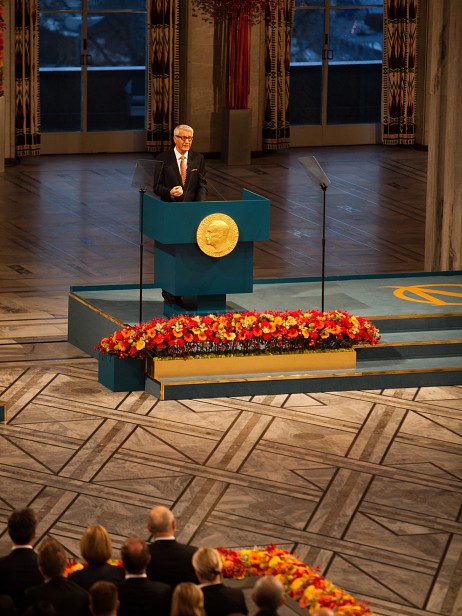I think I know why Norway gave the Nobel Peace Prize to the European Union: they are desperate for more cows.
Many are perplexed by the motivation behind this year’s award. Scholars and know-it-alls across Europe have tried guessing why politicians from a country that has rejected union membership honored the EU. Speeches at today’s award ceremony outlined historical milestones that brought 27 countries together after two world wars, while naysayers balk at the Peace Prize being given to a union with a huge military.
 But maybe everyone is looking too hard, too deep for a reason. This year’s award could be a simple cry for help: Norway needs more butter and cheese.
But maybe everyone is looking too hard, too deep for a reason. This year’s award could be a simple cry for help: Norway needs more butter and cheese.
I was a little hungry when I arrived at Oslo City Hall this morning for the Nobel Peace Prize Ceremony. As I listened to Thorbjørn Jagland, the former Norwegian prime minster who heads the Peace Prize selection committee, my brain turned his eloquently delivered speech about EU’s accomplishments into a manifesto to solve Norway’s dairy shortage.
When Jagland spoke about how the Coal and Steel Community in 1950 planted the seed of promoting peace between nations through economic integration, I thought about how a Cow and Butter-Churning Alliance with Denmark could revolutionize trade in Norway and save us from another butter crisis.
When my stomach growled, I thought about how the lettuce-to-parmesan ratio in caesar salads across Norway will suffer next year because taxes on foreign cheeses will go up by 277%. I couldn’t help but wonder if Jagland was thinking the same thing. Before presenting the Nobel diploma he said: “What this continent has achieved is truly fantastic, from being a continent of war to being a continent of peace.”
And, maybe, of cheese.
Perhaps the Norwegian politicians who hold the coveted seats on the Nobel Peace selection committee dream of an abundance dairy products. Maybe last year’s butter crisis and the looming hike in foreign cheese prices has finally got a few politicians rethinking Norway’s draconian protectionist policies. The rules are meant to protect local products and the jobs that they create, but the country’s determination to be self-sufficient has come with a price: poor selection at the grocery store, increasingly high food prices and an occasional famine.
Norway is not part of the EU. In fact, 75% of its electorate is against joining. One of the side effects of an EU membership is that Norway would have to change its trade policies. Maybe Jagland just wanted some cheap cheese and realized that the EU could be the secret to liberating Norway’s trade policies.
Or maybe I shouldn’t have gone to the ceremony hungry.




